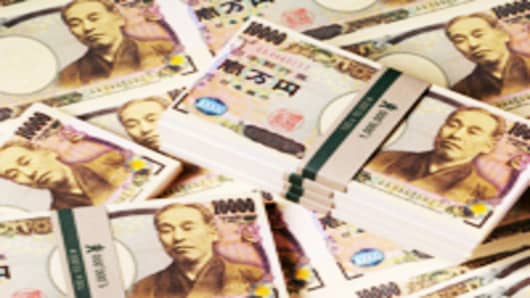Currency markets are on high alert for intervention from Japan’s central bank to weaken the yen, which jumped to a seven-month peak overnight after the Federal Reserve outlined aggressive steps to revive the U.S. economy.
Analysts say that any intervention to crimp yen strength, which is hurting exporters, is likely to have only a short-term impact and to really take the wind out of the sails of the strong yen, Japan needs to follow through with monetary easing steps of its own.
According to Dow Jones newswires, the Bank of Japan “checked” the rate at which the yen trades against the dollar during the New York trading session– a move widely seen in currency markets as a precursor to central bank intervention.
“The market is very much on alert for interventionand I wouldn’t be surprised if the Bank of Japan steps into the market,” said Sean Callow, Senior Currency Analyst at Westpac Bank in Sydney. “The chances of intervention have risen overnight and we are trading at levels where they could intervene.”
Japan last intervened in the currency markets in late October 2011 when the yen hit a record high against the dollar around 75.50, spending roughly 1 trillion yen ($13 billion) to stem a rise in its currency.
The yen has risen 8 percent against the dollar since March and concerns that its strength will dent exporters’ competitiveness and derail a fragile economic recovery have prompted policy makers to step up their rhetoric on the currency in recent months. The yen was trading at 77.57 per dollar in Asian trade on Friday, off seven-month highs hit overnight at around 77.11.
On Friday, Japan’s Finance Minister Jun Azumi said Japan will take decisive action to curb excessive strength in the yen if necessary. Those comments came just after the government cut its assessment of the economyfor a second month running and warned that growth is slowing.
In Japan, the finance ministry takes the decision to intervene in the currency markets and the Bank of Japan acts on its behalf.
Yen Headache
The Fed’s decisionto initiate a third round of quantitative easing or asset purchases to boost the U.S. economy fuels Tokyo’s currency headache, analysts say, since a side effect of monetary stimulus in the U.S. is a weakening in the dollar against major currencies.
“I think the risks of intervention have risen but it will only lead to temporary weakness in the yen,” said Paul Mackel, Head of Asian FX Research at HSBC in Hong Kong.
Boris Schlossberg, Managing Director of FX Strategy at BK Asset Management in Las Vegas, adds: “Japan has been the single biggest victim of all the QE easing that the Fed has done because Japan has the worst of both worlds. It is extraordinarily export dependent and it has seen its currency appreciate irrespective of the fact that its economy has done much worse.”
“At this point I think they're just absolutely pulling their hair out trying to see if they can stand the strength of the yen,” he told CNBC Asia’s “Squawk Box”.
While Japan’s economy has held relatively well this year, lifted by last year’s fiscal stimulus in the wake of the massive earthquake and tsunami in March, worries about the outlook have risen. Data this week showed the economy grew just 0.3 percent in the second quarter from the previous quarter, compared with growth of 1 percent in the first quarter.
To weaken the yen significantly, the central bank should step up asset purchases, analysts said.
“The only thing the Japanese can do is actually announce their own QE program because that seems to be the only thing the market respects and that is the one thing that could possibly weaken the yen,” said Schlossberg.
“But, they have not been dramatic enough to want to expand the balance sheet of the BOJ, the way the Fed has been willing to expand its own balance sheet. So what you’re seeing here is this incredible conflict going on — eventually they're probably going to have to resolve it by committing to a QE,” he added.
Westpac’s Callow agreed with the view, saying focus would now turn to the Bank of Japan’s policy meeting next week. “The BOJ can’t sit idle now, it has to do something,” he said.
- By CNBC's Dhara Ranasinghe


